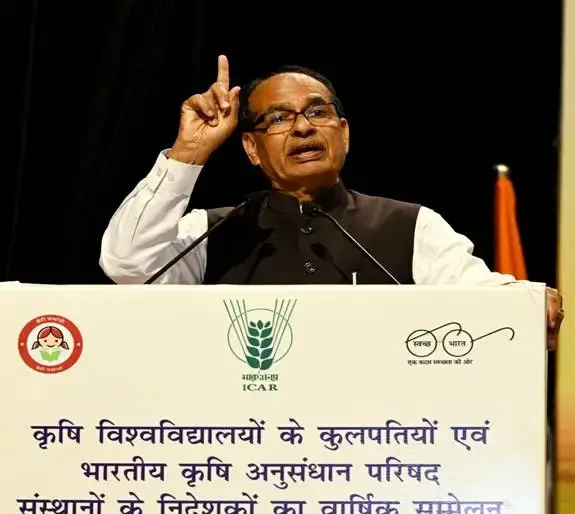How Can Science-Based Agricultural Transformation Achieve a Viksit Bharat?

Synopsis
Key Takeaways
- Science-based agricultural transformation is essential for progress.
- Empowering farmers is critical for achieving a Viksit Bharat.
- The Viksit Krishi Sankalp Abhiyan aims to provide grassroots solutions.
- Implementing the “Lab to Land” initiative is urgent.
- Promoting natural and organic farming practices is vital.
New Delhi, May 20 (NationPress) to realize the vision of a “Viksit Bharat”, it is essential to enhance agriculture and empower farmers, stated Union Agriculture Minister Shivraj Singh Chouhan on Tuesday.
The Union Minister emphasized that science-driven agricultural transformation is our priority, and integrating traditional farming methods is equally important.
During the annual meeting of agricultural university vice chancellors and directors from the Indian Council of Agricultural Research (ICAR), the minister called for their active involvement in the Viksit Krishi Sankalp Abhiyan, alongside their educational duties.
He highlighted that the immediate execution of the “Lab to Land” initiative is crucial.
He presented a six-point strategy from the Ministry aimed at realizing the objectives of a developed India, which includes boosting productivity, lowering production costs, ensuring fair pricing for produce, compensating for losses from natural calamities, encouraging agricultural diversification, and enhancing value addition and food processing.
The minister also stressed the importance of promoting natural and organic farming practices, stating that agricultural diversification and the preservation of our planet are among our top collective responsibilities.
The Viksit Krishi Sankalp Abhiyan is described as a historic initiative within the agricultural sector, aimed at empowering farmers, enhancing their livelihoods, and delivering direct solutions to their challenges at the grassroots level.
Chouhan announced plans for a foot march on May 25–26 to directly engage with farmers and better understand their concerns.
He reiterated that India’s goals encompass ensuring food security, restoring national grain reserves, and positioning India as the global food basket.
“We are one team,” he asserted, “and our motto is One Nation, One Agriculture, One Team.”
Union Minister of State for Agriculture, Bhagirath Choudhary, remarked that agriculture serves as the nation’s backbone, while farmers are its essence.
He called for unified efforts to tackle climate change to ensure the sustainability and advancement of agriculture, underlining the necessity for agriculture to become innovation-driven and research-focused for India to evolve into a developed nation.









